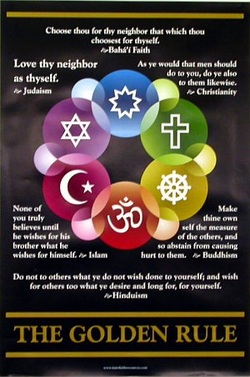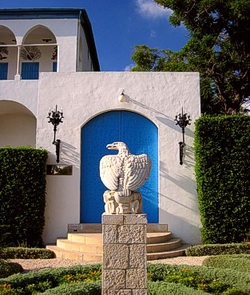Who are the Baha'is?
Baha'is come from every conceivable ethnic, racial, national, religious, and cultural background, speak hundreds of languages, live all over the world, and are united in the belief that the time has come for humanity to advance to the next phase of its spiritual evolution. Baha'is are followers of Baha'u'llah, whom we believe is the Promised One of all world religions. Baha'u'llah said: “The well-being of mankind, its peace and security, are unattainable unless and until its unity is firmly established.” Therefore Baha'is strive to establish the recognition of the oneness of humanity wherever they study, work, and reside.
How does the Baha'i Faith relate to other world religions?

Baha'is believe that Baha'u'llah is the most recent in a line of Divine Educators (including Abraham, Moses, Buddha, Krishna, Jesus Christ, and Muhammad) all sent from the same Source, with the same purpose - to help humanity evolve and grow and achieve its great potential both spiritually and materially. Therefore we accept the truth of all the major world religions and the spiritual truths which appear consistently throughout them, like the Golden Rule.
Of course, there are many differences between the teachings of the major world religions as well. On this point, Baha'u'llah wrote, "The All-Knowing Physician hath His finger on the pulse of mankind. He perceiveth the disease, and prescribeth, in His unerring wisdom, the remedy. Every age hath its own problem, and every soul its particular aspiration. The remedy the world needeth in its present-day afflictions can never be the same as that which a subsequent age may require." Therefore the differences that we see between the social teachings of major world religions are due to the differing requirements of the age in which they were revealed, and the capacity of the human beings alive at the time to understand.
What we know now is that humanity is reaching a new stage. It is analogous to a coming-of-age process - or to put it more dramatically - like the labor involved in childbirth. There is pain and suffering, there are global crises, and old institutions which served us well for centuries are crumbling. Ours is the responsibility to engage in a constructive process, to establish new ways of interacting that reflect spiritual qualities of trustworthiness, honesty, loving-kindness, justice, and generosity of spirit.
Of course, there are many differences between the teachings of the major world religions as well. On this point, Baha'u'llah wrote, "The All-Knowing Physician hath His finger on the pulse of mankind. He perceiveth the disease, and prescribeth, in His unerring wisdom, the remedy. Every age hath its own problem, and every soul its particular aspiration. The remedy the world needeth in its present-day afflictions can never be the same as that which a subsequent age may require." Therefore the differences that we see between the social teachings of major world religions are due to the differing requirements of the age in which they were revealed, and the capacity of the human beings alive at the time to understand.
What we know now is that humanity is reaching a new stage. It is analogous to a coming-of-age process - or to put it more dramatically - like the labor involved in childbirth. There is pain and suffering, there are global crises, and old institutions which served us well for centuries are crumbling. Ours is the responsibility to engage in a constructive process, to establish new ways of interacting that reflect spiritual qualities of trustworthiness, honesty, loving-kindness, justice, and generosity of spirit.
Who is Baha'u'llah?

Baha'u'llah ("the Glory of the Lord") was born in 1817 in Tehran, the capital city of the Persian Empire (now known as Iran). He was born into a noble family but turned away from a comfortable life in order to help the poor and champion the cause of justice. From the moment He arose to proclaim the Cause of God, He endured great suffering. He and His family were imprisoned, exiled, forced to cross mountains in the dead of winter on foot. First they were exiled to Baghdad, from which they were again banished to Adrianople, then Constantinople, and finally to Akka, the prison-city of the Ottoman Empire (now Israel). Wherever He went, however, His manner, words, and bearing made such an impression that those who were ready to persecute Him and the Baha'is soon became ardent admirers and supporters. The influence He exerted over the hearts and minds of whomever He encountered was like a flame that kindled the souls, and could not be put out by any degree of persecution. Baha'u'llah passed away in 1892 just outside of Akka, Israel.
